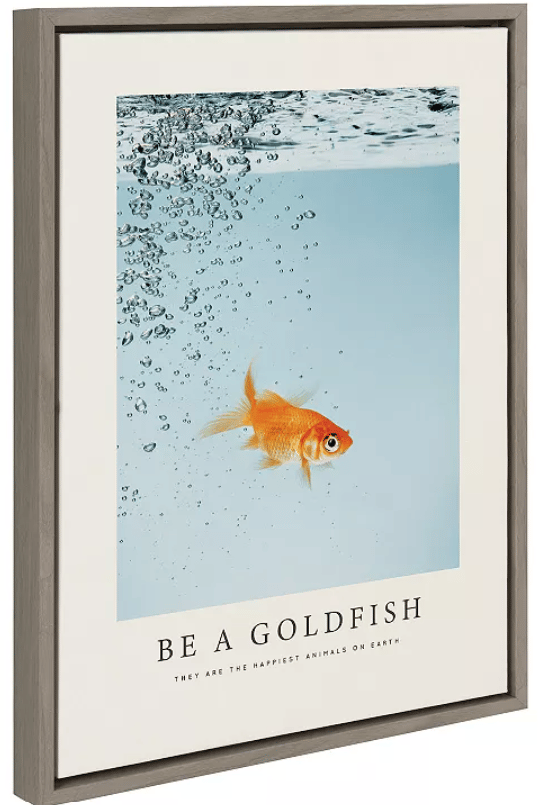🦆 CHILL THE DUCK OUT
Volume 029: I'm not a fishtologist, but I think goldfish are onto something.
💭 Cold Open
Life advice from discount home décor stores is underrated in my book.
A couple weeks ago, my wife needed to pick up some decorations for her office at work because it was feeling a bit bare. Naturally, this meant a trip to Home Goods, where I would wander aimlessly while she made thoughtful decisions about the right color combination of knick knacks and organization solutions for her desk. I'm good at this role. I've perfected the supportive nod and the "yeah, that one's nice" comment that works for literally any item she shows me.
But then I saw something as we deviated from the focus of this visit. A picture that stopped me mid-aisle.
It was a simple piece with a goldfish on it, and the words: "Be a goldfish. They are the happiest animals on Earth."

Now, is this scientifically accurate? I have absolutely no idea. I'm not a fishtologist. I don't know if goldfish are actually the happiest animals on Earth, or if that honor goes to golden retrievers or those weird quokkas in Australia that always look like they just heard the world's best joke. I also don't know if it's true that goldfish only have like a 10-second memory span. That might be a myth. Again, not a fishtologist.
But what I do know is this: I loved that picture because the idea behind it hit me right in the feelings. The suggestion that a key to happiness might be moving on from mistakes and failures, not dwelling on them, and just... swimming forward like nothing happened. Like you've got a 10-second memory and yesterday's screw-up might as well have happened to a completely different fish.
I am very much not a goldfish. I'm more like an elephant. Supposedly great memory, never forgets a single embarrassing thing I've done, replays my greatest hits of failure at 2 AM when I'm trying to sleep. That time I said the wrong thing at a meeting three years ago still stings sometimes. That joke that landed weird at a party in 2019 is one that I still wish I could take back. My brain is like a very dedicated archivist whose sole job is cataloging every mistake I've ever made and presenting them to me at the most inconvenient times.
So standing there in Home Goods, holding a picture of a smiling goldfish while my wife evaluated which bin would best organize her various forms needed by her staff, I thought: what if I could be more like this fish? What if I could just... move on? What if I could let go of the mistakes, stop the mental highlight reel of my failures, and focus on swimming forward instead of swimming in circles around my past? These are all questions that have plagued me for years and years and years, and one of my tougher nuts to crack.
The goldfish didn't buy a self-help book about it. The goldfish didn't journal through its feelings. The goldfish just forgot and kept swimming. And apparently, according to this $29.98 piece of wall art, it's the happiest animal on Earth because of it.
I didn't buy the picture that day. But I will someday. Because I need that daily reminder that maybe, just maybe, a secret to happiness isn't having a better memory. It's having a worse one. At least when it comes to our failures.
So this week, we're talking about the science of letting go, why dwelling on mistakes keeps us stuck, and how to be a little more goldfish and a little less elephant when it comes to our failures.
🧠 The Science Bit
Your brain's excellent memory is sometimes your happiness's worst enemy and this is backed by people who study this stuff professionally instead of just staring at motivational fish pictures in home décor stores.
Your brain is wired to remember the bad stuff.
The annoying part is that your brain is literally programmed to remember negative experiences more vividly than positive ones. It's called the negativity bias, and evolutionarily it made sense. The caveman who remembered "that plant made me sick" survived longer than the optimistic guy who kept eating poison berries. But in modern life, this means your brain holds onto that embarrassing thing you said at work with the same intensity it would hold onto "that saber-toothed tiger tried to eat me." Your brain can't tell the difference between a legitimate survival threat and a social faux pas from 2019, so it treats them both like critical information that must be reviewed repeatedly at 3 AM. Thanks, brain.
Dr. Rick Hanson's research shows that negative experiences stick to your brain like Velcro while positive ones slide off like Teflon. You need about five positive experiences to counterbalance one negative memory. This is why you can receive 20 compliments and one criticism, and guess which one you're still thinking about three weeks later?
Dwelling on mistakes doesn't help you learn from them.
Studies by Dr. Edward Watkins at the University of Exeter show that rumination doesn't actually help you solve problems or learn from mistakes. Despite what your brain insists while you lie awake in the middle of the night, replaying your failures on loop doesn't lead to useful insights. It just makes you feel worse and less capable of fixing anything. The difference between productive reflection and destructive rumination comes down to this: reflection asks "what can I learn from this?" and moves forward. Rumination asks "why am I such a disaster?" and stays stuck in the same spot, spinning its wheels.
Self-forgiveness is a superpower most people don't use.
Research from Dr. Fred Luskin at Stanford shows that people who actually let go of past mistakes experience lower stress, anxiety, and depression, plus better physical health markers like lower blood pressure and better sleep. Your body literally functions better when you stop beating yourself up about that thing from five years ago that nobody else even remembers. Meanwhile, Dr. Carol Dweck's growth mindset research shows that people who view failures as learning opportunities rather than permanent character flaws recover faster and achieve better outcomes. The difference isn't whether you fail. Everyone fails. The difference is whether you treat failure like useful feedback or like evidence of your unworthiness.
The present moment is where happiness lives.
Dr. Matt Killingsworth's Harvard research found that people are happiest when focused on what they're doing right now, not when their minds wander to past failures or future worries. A wandering mind is an unhappy mind. The goldfish, with its alleged 10-second memory, might actually be onto something. Not because forgetting is good, but because living in this moment instead of dwelling in past moments is where wellbeing lives.
TL;DR: Science says ruminating on your mistakes is like paying rent to your regrets, who are terrible roommates. Letting go, forgiving yourself, and living in the now is where the good stuff lives. Better mood, better health, better everything. The goldfish forgot what happened 10 seconds ago and seems thrilled about it. Be like the goldfish. Live your best 10-second life.
🍟 This Week’s Happytizer
This week, I want you to practice being a goldfish. Pick one failure, mistake, or embarrassing moment that you've been replaying in your mental highlight reel and intentionally let it go.
Pick one approach:
The 10-Second Reset: When you catch yourself dwelling on a past mistake, give yourself exactly 10 seconds to acknowledge it, then consciously shift your attention to what's happening right now. What can you see? Hear? Feel? Be relentlessly present for the next minute.
The Friend Treatment: Write down the mistake you keep beating yourself up about. Now write what you would say to a close friend if they came to you with the same mistake. Read it out loud. Then ask yourself why you don't deserve the same kindness.
The Learning Extraction: Take one failure you keep reliving and write down exactly one lesson you learned from it. Just one. Then ceremonially "close" that failure. Delete the note, burn the paper, whatever feels symbolic, and commit to not revisiting it. The lesson is extracted. The dwelling is done.
The Goldfish Declaration: Every time you catch yourself spiraling about a past mistake, literally say out loud (or in your head if you're in public): "I'm being a goldfish about this." It sounds ridiculous. That's the point. The absurdity might just help you let go.
The Gratitude Counterbalance: For every mistake you catch yourself dwelling on, immediately list three things that went right today. Fight your brain's negativity bias with deliberate positivity. It's annoying that you have to do this, but your brain started it.
The goal isn't to never think about past mistakes. It's to stop letting them take up permanent residence in your head, paying no rent and trashing the place. Notice how it feels to consciously choose to move forward instead of swimming in circles.
Bonus points if you actually buy yourself a goldfish picture and put it somewhere you'll see it when you need the reminder. Or better yet… mail it to me to hang in my office/laundry room.
🎉 Unsolicited Joy of the Week
Sometimes the best way to practice being a goldfish is to accidentally already be one. Over at Brightside, people shared their most gloriously forgetful moments, and honestly, they're living the goldfish dream.
The best part is that they all laughed about it. No shame spirals, no dwelling on the mistake, just "well, that was ridiculous" and moving on with their lives. Pure goldfish energy. They forgot, they laughed, they kept swimming. Maybe that's the actual secret: not that we need to forget our mistakes, but that we need to remember how to laugh at ourselves when we do.
🐠 Read all the hilariously forgetful stories at Brightside
💬 Tell me about a time you finally let something go
What mistake or failure did you stop dwelling on, and how did it feel when you finally released it?
If this helped you chill out about your past even a tiny bit, pass it on… or I’ll arrive with a goldfish named Regret and a TED Talk called “The Neuroscience of Beating Yourself Up (And How to Stop).”
👋Speaking of embracing imperfection...
Full transparency: 1440 also sponsored last week's newsletter. Did I remember that when I agreed to have them sponsor this week too? Nope. Goldfish brain strikes again. But I'm not dwelling on it, because 1440 is actually worth mentioning twice.
It's a free daily newsletter that gives you unbiased news in 5 minutes flat – no political spin, no outrage bait, just the facts. Perfect for those of us who want to stay informed without our anxiety doing backflips. Plus, unlike my goldfish memory, 1440 actually remembers to show up in your inbox every morning with everything you need to know.
And yes, when you simply click the link, I get a few cents. So help me fill my piggy bank..
Join over 4 million Americans who start their day with 1440 – your daily digest for unbiased, fact-centric news. From politics to sports, we cover it all by analyzing over 100 sources. Our concise, 5-minute read lands in your inbox each morning at no cost. Experience news without the noise; let 1440 help you make up your own mind. Sign up now and invite your friends and family to be part of the informed.
🫶 Duckin’ Done
That's Volume 029.
Here's to goldfish wisdom, short memories for failures, and swimming forward instead of swimming in circles.
Until next time: breathe deep, let it go, and chill the duck out.
Jason
🔬 Behind the Curtain
Susan Nolen-Hoeksema's decades of rumination research at Yale established clear links between repetitive negative thinking and depression. Rick Hanson's work on the negativity bias explains why negative experiences stick while positive ones fade. Edward Watkins at the University of Exeter distinguishes productive reflection from destructive rumination. Fred Luskin's Stanford forgiveness research demonstrates measurable health benefits of letting go. Matt Killingsworth's Harvard happiness study using real-time data collection found that present-moment awareness correlates strongly with wellbeing. Carol Dweck's growth mindset research and Steven Hayes's work on psychological flexibility both emphasize the importance of viewing failures as learning opportunities rather than permanent character assessments.



